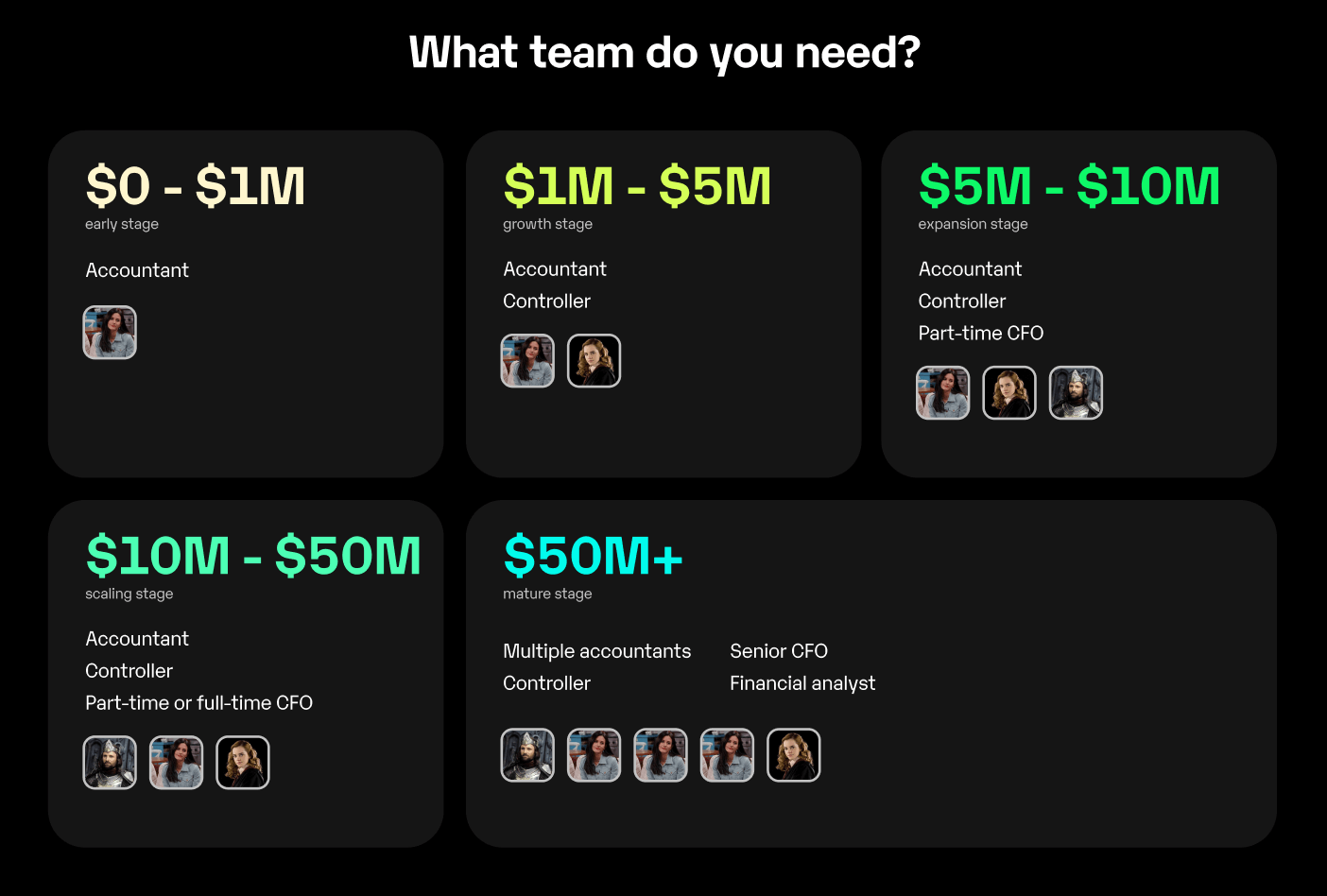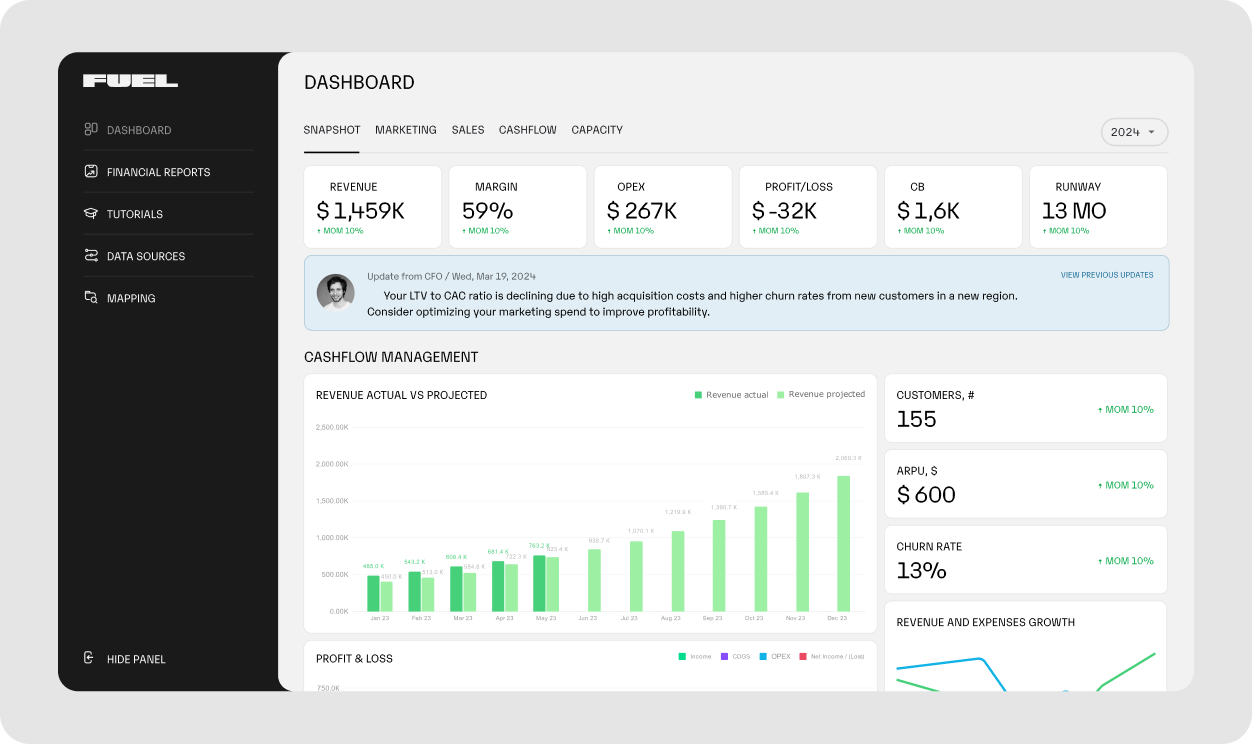


Last month, I watched a founder frantically calculate runway on napkins during a board meeting. His company was growing 40% month-over-month, but he couldn't tell investors exactly where the money was going or when they'd need the next round.
Sound familiar?
Growing companies face this weird paradox: you're too big for basic bookkeeping services but not quite ready for a $300K+ full-time CFO. Your spreadsheets are becoming unmanageable, cash flow feels like a mystery, and investors are asking questions you can't answer with confidence, whether from a lack of financial expertise or well-structured financial management.
This guide will help you decide if it’s time to hire fractional CFO services — and introduce a smarter alternative that combines expert guidance with modern forecasting technology, acting as an AI CFO. We'll cover when you may need financial leadership, how to find the right fit, and why traditional fractional CFO arrangements might not give you everything you need.
By the end, you'll know exactly what type of cfo services make sense for your growth stage, how much a fractional CFO costs, and what red flags to watch for when evaluating options for your business needs.
Think of fractional CFO services as financial leadership on demand. Instead of hiring a full-time chief financial officer, you get access to an experienced finance professional who works with multiple companies simultaneously.
A fractional CFO handles the strategic stuff your bookkeeper can't: financial forecasting, investor presentations, cash flow management, and growth planning. They're different from CPA firms and traditional accounting services that focus on recording history — fractional CFOs help you see what's coming, offering proactive financial strategy and strategic financial leadership.
The arrangement typically involves 10–30 hours per month on an hourly basis, either as an ongoing retainer or project-based engagement, making it more cost-effective than a full-time hire. You get C-level financial expertise without the full salary.
For a deeper dive into exactly what fractional CFOs do day-to-day, check out our complete guide to fractional CFO services.
Most companies start considering fractional CFO services when they hit $5-50 million in annual revenue, but the real trigger isn't revenue size — it's increasing financial complexity and growth velocity.
Here are the founder pain points that signal you're ready to look for help from fractional CFO firms.

Your sales are exploding, but you can't figure out which customer segments, products or channels actually drive profit. You're making decisions based on gut feeling because your financial metrics are a mess.
You know money comes in and goes out, but you don’t actually manage cash flow to be able to predict when you'll start having liquidity issues. Building proper cash flow forecasting becomes critical when growth accelerates.
Whether you’re preparing to raise capital via equity funding or debt, investors want to see clean examples of financial dashboards, unit economics models and scenario planning, i.e., clean financial reporting. Your current setup can't produce these without weeks of manual work.
Multiple revenue streams mean you need sophisticated financial systems with tracking and analysis. Your simple P&L doesn't show which initiatives actually work. Fractional CFO services can fine-tune systems and support strategic planning for sustainable growth.
You've got contractors in three countries, subscription revenue, one-time sales, and maybe some services mixed in. Traditional accounting can't give you the insights you need. Complex structures need someone who can handle these financial operations and ensure existing systems are managed properly.
The market for fractional CFOs and outsourced CFO services has exploded, which means more options but also more variability in quality. Here's how most founders approach the search to find the right person:
The key is analyzing fit for your specific situation rather than blindly trusting recommendations. A fractional CFO who's perfect for a SaaS company might struggle with e-commerce unit economics, and vice versa.
Here's where traditional fractional CFO arrangements fall short: you get financial expertise, but you're still stuck with manual processes, limited visibility between meetings and no integrated technology stack.
Fuelfinance combines dedicated financial experts with cloud-based dashboards and AI-powered forecasting — giving you more than part-time CFO support while costing less than full-time hiring.

What makes Fuelfinance different:
Instead of waiting for monthly reports, you get real-time visibility into cash flow, outstanding payments, unit economics and growth metrics. The AI handles routine forecasting while human experts focus on strategy and interpretation. The system improves profitability, avoids liquidity issues, and supports your exit strategy by keeping books in order and supporting valuation.
The setup process takes about two weeks with expert help, not months of painful integrations. You're getting an entire FP&A system that scales with your growth, not just periodic advice.
Hit us up to see how we can help you grow.
Real users report measurable improvements pretty quickly after implementing fractional CFO services.
Common outcomes include:
The key is finding services that provide both expertise and systematic improvements to your financial infrastructure, not just periodic advice.
Understanding the differences between these options helps you choose the right fit for your situation
Let's talk numbers. CFO Recruit data shows that average US fractional CFO hourly rates range from $150 to $350 per hour, depending on the experience, industry etc.
A full-time CFO costs $250K-400K annually (salary plus benefits). Fuelfinance delivers similar strategic value for a fraction of that cost, plus you get the technology infrastructure that most in-house finance teams lack. Book a demo and we’ll show you how to save 50-90% on hiring fractional CFO services.
The key is choosing services that deliver systematic improvements, not just periodic advice. You want better financial infrastructure, not just someone to interpret your existing mess.
The process should be straightforward, not a months-long evaluation cycle.
The process is super simple: free demo, two-week implementation with expert help, then ongoing support with unlimited consultations.
You get to see exactly what your financial dashboard tool will look like before committing, and the implementation team handles all the technical setup. No months of painful integrations or wondering if it'll actually work with your systems (it will, we tested hundreds to make sure all connectors run smoothly).
Here's the decision framework: if you're spending more than 10 hours weekly on financial tasks, can't answer basic questions about unit economics or cash flow, or need investor-ready materials to raise capital, you need professional help.
The common mistake is hiring fractional CFOs without technology support. You get expertise, but are still stuck with manual processes and limited visibility.
Smart founders choose solutions that provide both human expertise and real improvements to financial infrastructure. You want better data, clearer insights and more time to focus on what you do best and meet financial goals.
Fuelfinance combines the strategic guidance of experienced CFOs with modern technology that automates routine tasks, provides real-time financial performance visibility and helps overcome financial risks. Instead of waiting for monthly reports, you get continuous insights that inform daily decisions.
Ready to level up your financial management? Book a free demo to get yourself back the time to focus on growth.
Yes, if you're at the right stage. Growing businesses generating $5-50M annually with complex operations, multiple revenue streams or fundraising plans typically see immediate ROI from fractional CFO services. It can be super valuable if you’re facing financial complexity or planning an exit strategy.
Part-time CFO services involve a dedicated professional working set hours weekly for your company only. Think of it as a traditional employee arrangement with reduced hours.
Companies that offer fractional CFO services involve professionals who split time among multiple clients, offering specialized expertise as needed. They bring broader experience from working with various companies, but may have less dedicated time for your specific situation.
Both can work well — the choice depends on whether you need consistent weekly support or specialized expertise for specific projects.
Other options include interim CFO services (short-term, for transitional periods), or ongoing support combined with financial analysis and forecasting software like Fuelfinance.
Start with the basics: clean up your financial reporting and establish regular cash flow forecasting.
Many founders in this situation benefit from financial management software that provides CFO-level insights without the full cost. Fuelfinance, for example, offers comprehensive financial analysis and forecasting and access to experienced fractional CFO consultants, without full-time executive overhead.
You can also consider project-based engagements for specific needs like fundraising prep or financial model development, then build ongoing capabilities as you grow.
The key is getting systematic improvements to your financial infrastructure, not just someone to interpret your existing spreadsheets.
Absolutely, and you should prioritize relevant industry knowledge when possible. A CFO who understands SaaS metrics offers multiple benefits and will provide much better guidance than someone who primarily works with manufacturing companies.
Look for professionals with specific experience in:
Industry-specific knowledge becomes particularly important for complex areas like revenue recognition, unit economics calculations and benchmark comparisons, helping you make informed decisions.
At Fuelfinance, we work primarily with startups and high-growth SMBs, so our team understands the specific challenges of scaling companies and can provide relevant benchmarks and strategies.


Just imagine how that would transform your team’s productivity and focus? Talk to our financial experts to know more.